Tracking Cash and Voucher Assistance
Grand Bargain signatories committed to increase the use of CVA, and to use common markers to measure these increases. Although the volume of CVA is beginning to be more effectively tracked, technical and policy challenges remain. These include:
- Defining what data to collect, and how
- Ensuring commitment to and use of data categories and systems
- Addressing shortcomings of existing reporting systems which have often not been designed to include or disaggregate cash, vouchers, and other modalities
- Reaching common agreement on standard categories for reporting to avoid incomplete and inconsistent data.
Current priorities
From 2017 to 2019, the CALP Network co-led the Grand Bargain Cash sub-workstream on Tracking CVA with DG ECHO, with the main objective of agreeing minimum requirements for tracking CVA. This includes the integration of CVA into key interagency reporting systems and platforms, namely OCHA’s Financial Tracking Service (FTS) and HPC Project Module, the International Aid Transparency Initiative’s (IATI) Data Standard, and 3W (Who does What, Where) reporting. The sub-workstream on Tracking CVA has now been merged into the Efficiency, Effectiveness and Value for Money sub-workstream, which the CALP Network will continue to co-lead.
Featured content

Tracking Cash & Voucher Assistance Workshop – Part 2: Report
Presentation
Do you want to read the latest on discussions on how to best track cash and voucher assistance in global interagency reporting systems? The CALP Network and ECHO have just released Tracking Cash & Voucher Assistance Workshop – Part 2: Report. Key recommendations emerging from the workshop are summarized below. These will be used in the coming months as a basis to develop guidance for...

Measuring Cash Transfer Programming – Scoping study
Report
This scoping study explores technical and policy issues that are constraining progress towards better measurement and reporting of Cash Transfer Programming (CTP) and addresses these to identify ways forward. The study was developed with the following objectives: • Map and document how different implementing agencies and donors are measuring cash and voucher programming data at the...

Tracking Cash and Voucher Assistance: Agreements, recommendations and minimum requirements from the Grand Bargain cash workstream
Guidelines and Tools
This document comprises the key outputs of the work undertaken through the Tracking Cash and Voucher Assistance (CVA) Working Group from 2017 to 2019. The Tracking CVA Working Group was established as the
platform for engagement and decision-making for the sub-workstream on Tracking CVA, which is part of the Grand Bargain Cash Workstream. The Tracking CVA sub-workstream was co-led by the the...
Thematic lead
Latest

Can Emergency Cash Transfers ‘Piggyback’ on Existing Social Protection Programmes?
Policy paper
This background note focuses on the current discussion among actors in the humanitarian and social protection sectors regarding the use of existing social protection programmes to provide an emergency response. It outlines the overlaps between social protection and humanitarian responses, considers a...
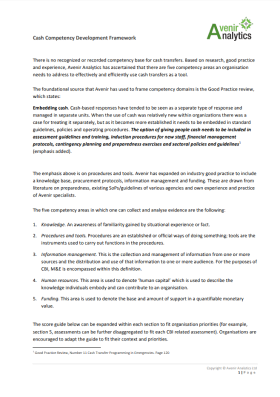
Cash Competency Development Framework
Guidelines and Tools
There is no recognized or recorded competency base for cash transfers. Based on research, good practice and experience, Avenir Analytics has ascertained that there are five competency areas as an organisation needs to address to effectively and efficiently use cash transfers as a tool.
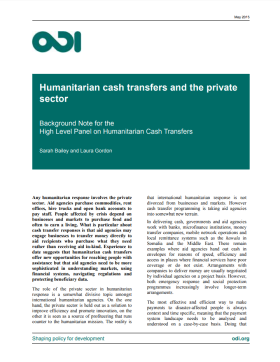
Humanitarian Cash Transfers and the Private Sector
Policy paper
The role of the private sector in humanitarian response is a somewhat divisive topic amongst international humanitarian agencies. This publication discusses the challenges and obstacles to a more effective engagement between the private sector and humanitarian actors as well as the potential role...

Remittances to Syria: What works, where and how
Report
This study sought to understand remittance flows into Syria, and established that various Informal Value Transfer Systems (IVTS) are used, to the exclusion of the formal banking sector. Registered and unregistered hawala, courier services and family connections are used. Remittances have played an...
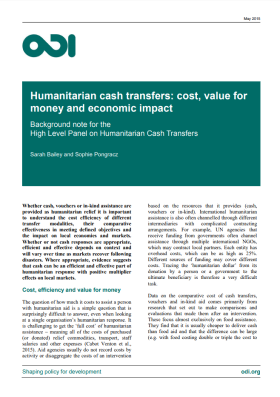
Humanitarian Cash Transfers: Cost, value for money and economic impact
Policy paper
The question of how much it costs to assist a person with humanitarian aid is a simple question that is surprisingly difficult to answer, even when looking at a single organisation’s humanitarian response. It is challenging to get the ‘full cost’ of humanitarian assistance – meaning all of the...
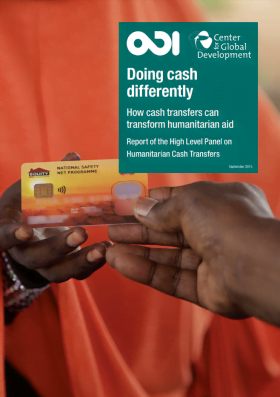
Doing Cash Differently: How cash transfers can transform humanitarian aid?
Policy paper
This report commissioned by the Overseas Development Institute highlights why giving aid directly in the form of cash is often a highly effective way to reduce suffering and to make limited humanitarian aid budgets go further. The publication, ,written by the High Level Panel on Humanitarian...

Know Your Customer Standards and Privacy Recommendations for Cash Transfers
Guidelines and Tools
This report reviews how Know Your Customer (KYC) standards – rules designed to combat criminal money laundering and terrorism financing – are applied in humanitarian cash programs. The report examines the practices of aid agencies and their processing of the personal information of...
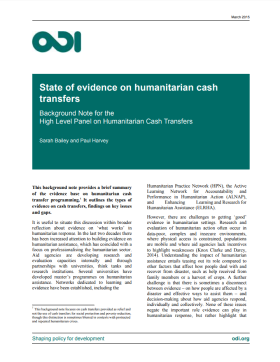
State of Evidence on Humanitarian Cash Transfers
Policy paper
The “State of evidence on humanitarian cash transfers” background note provides a brief summary of the evidence base on humanitarian cash transfer programming. The report also outlines the types of evidence on cash transfers, findings on key issues and gaps. This publication is an output of the...

Challenges and the State of Play of Interoperability in Cash Transfer Programming
Guidelines and Tools
This study explores the factors driving the design of interoperability for Cash Transfer Programming. It outlines the rapidly changing environment in which digital services are emerging, the types of digital collaborations that could be enabled, and the key design challenges that confront effective...
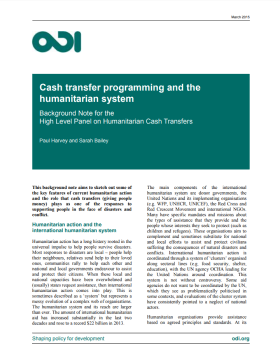
Cash Transfer Programming and the Humanitarian System
Policy paper
Cash transfer programming and the humanitarian system background note aims to sketch out some of the key features of current humanitarian action and the role that cash transfers play as one of the responses to supporting people in the face of disasters and conflict. Additionally, the publication...
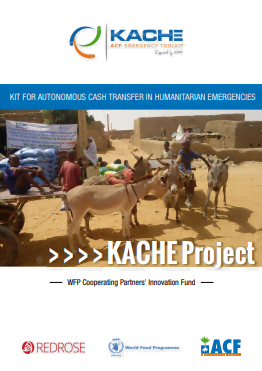
Kit for Autonomous Cash transfer in Humanitarian Emergencies (KACHE)
Guidelines and Tools
The present document reports the development of the Kit for Autonomous Cash transfer in Humanitarian Emergencies (KACHE), built upon Red Rose ONE system© supported by the WFP’s Cooperating Partners’ Innovation Fund (CPIF). Firstly, it gives a brief description of the main features of the kit....
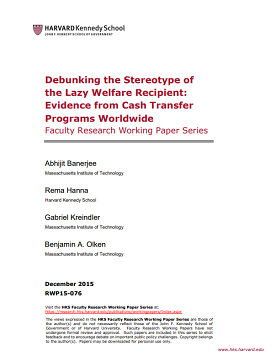
Debunking the Stereotype of the Lazy Welfare Recipient: Evidence from Cash Transfer Programs Worldwide
Report
Targeted transfer programs for poor citizens have become increasingly common in the developing world. Yet, a common concern among policy makers – both in developing as well as developed countries – is that such programs tend to discourage work. We re-analyze the data from 7 randomized controlled...

Value for Money of Cash Transfers in Emergencies
Report
The objective of this study is to analyse evidence on the Value for Money (VfM) of cash transfers. The study reviews evidence on the economy, efficiency and effectiveness of cash, vouchers and in-kind transfers, in order to support a more structured analysis of the VfM of different transfers. It is based...
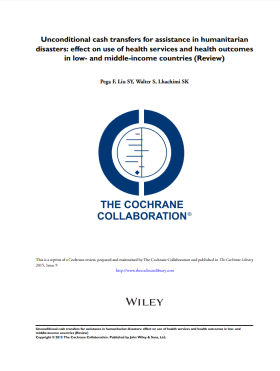
Unconditional Cash Transfers for Assistance in Humanitarian Disasters: Effect on use of health services and health outcomes in low- and middle-income countries
Report
Unconditional cash transfers (UCTs) for humanitarian assistance during disasters may improve health in low- and middle-income countries (LMICs) by giving recipients additional income. This study sought to assess the effect of UCTs on health services use, health outcomes, social determinants of health,...
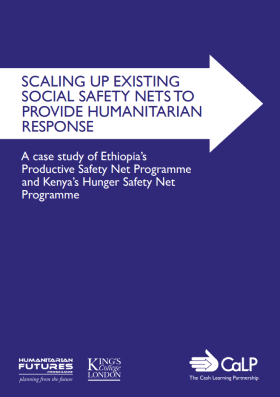
Scaling Up Existing Social Safety Nets to Provide Humanitarian Response: A case study of Ethiopia’s Productive Safety Net Programme and Kenya’s Hunger Safety Net Programme
Policy paper
A case study of Ethiopia’s Productive Safety Net Programme and Kenya’s Hunger Safety Net Programme. This thematic report has been undertaken as part of a 2013 research study entitled, Is Cash Transfer Programming ‘Fit for the Future’? The research was commissioned by the the CALP Network and...
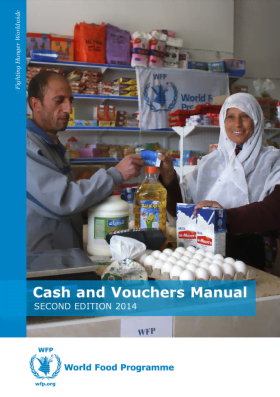
Cash and Vouchers Manual – Second edition
Guidelines and Tools
This second edition of the Cash and Vouchers Manual captures the latest corporately endorsed business processes and procedures, providing the most up-to-date tools (i.e. analytical, assessment, monitoring) that have been developed through close intra-departmental collaboration between Headquarters...
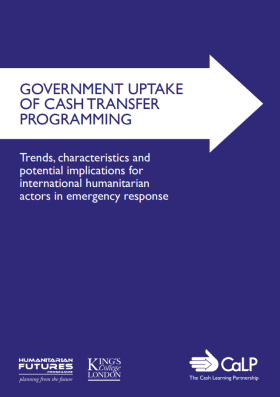
Government Uptake of Cash Transfer Programming: Trends, characteristics and potential implications for international humanitarian actors in emergency response
Policy paper
Trends, characteristics and potential implications for international humanitarian actors in emergency response. This thematic report has been undertaken as part of a 2013 research study entitled, Is Cash Transfer Programming ‘Fit for the Future’? The research was commissioned by the the CALP...
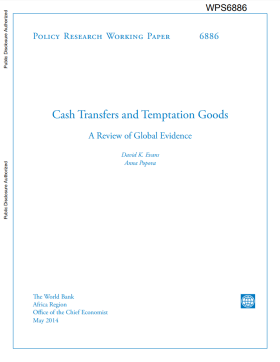
Cash Transfers and Temptation Goods: A review of global evidence
Report
Cash transfers have been demonstrated to improve education and health outcomes and alleviate poverty in various contexts. However, policy makers and others often express concern that poor households will use transfers to buy alcohol, tobacco, or other “temptation goods”. This paper reviews 19...
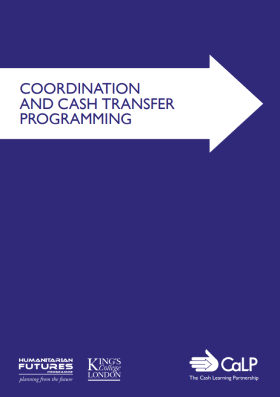
Coordination and Cash Transfer Programming
Policy paper
This thematic report has been undertaken as part of a 2013 research study entitled, Is Cash Transfer Programming ‘Fit for the Future’? The research was commissioned by the the CALP Network and undertaken by the Humanitarian Futures Programme (HFP), King’s College London. The overall...

Financing of Cash Transfer Programming
Policy paper
This thematic report has been undertaken as part of a 2013 research study entitled, Is Cash Transfer Programming ‘Fit for the Future’? The research was commissioned by the the CALP Network and undertaken by the Humanitarian Futures Programme (HFP), King’s College London. The overall...



